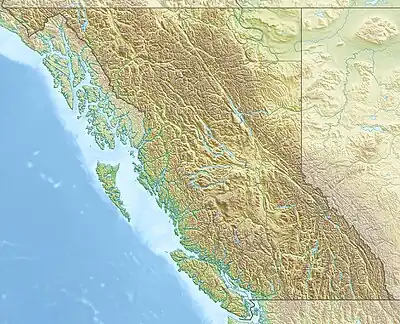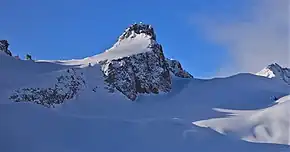| Omoo Peak | |
|---|---|
 North aspect in winter | |
| Highest point | |
| Elevation | 2,674 m (8,773 ft)[1] |
| Listing | Mountains of British Columbia |
| Coordinates | 50°57′58″N 117°20′59″W / 50.96611°N 117.34972°W[2] |
| Naming | |
| Etymology | Omoo |
| Geography | |
 Omoo Peak Location of Omoo Peak in British Columbia  Omoo Peak Omoo Peak (Canada) | |
| Country | Canada |
| Province | British Columbia |
| District | Kootenay Land District |
| Parent range | Selkirk Mountains Battle Range |
| Topo map | NTS 82K14 Westfall River[2] |
| Climbing | |
| First ascent | 1972 David Michael, Donald Daem[3] |
Omoo Peak is a 2,674-metre (8,773-foot) mountain summit in British Columbia, Canada.
Description
Omoo Peak is located in the Battle Range of the Selkirk Mountains.[4] The remote peak is set immediately west of Schooner Pass and approximately 8 km (5.0 mi) south of Glacier National Park. Precipitation runoff from the mountain drains north into Butters Creek and south into Houston Creek which are both tributaries of the Duncan River. Omoo Peak is more notable for its steep rise above local terrain than for its absolute elevation. Topographic relief is significant as the summit rises 1,450 meters (4,757 ft) above Houston Creek in 2.5 km (1.6 mi).
Etymology

The landform is named after Omoo, which was a Herman Melville novel published in 1847.[1] In the novel, "Omoo" was a Tahitian native whose name meant "a person who wanders," and is from the dialect of the Marquesas Islands in French Polynesia in the South Pacific Ocean which is the setting for the book.[4] The name was submitted by author/mountaineer Robert Kruszyna in 1972 and follows the Herman Melville-associated naming theme of the area established in 1958–59 by the Sam Silverstein-Douglas Anger climbing party.[4] The mountain's toponym was officially adopted on October 3, 1973, by the Geographical Names Board of Canada.[2]
Climate
Based on the Köppen climate classification, Omoo Peak is located in a subarctic climate zone with cold, snowy winters, and mild summers.[5] Winter temperatures can drop below −20 °C with wind chill factors below −30 °C. This climate supports a small unnamed glacier on the north slope of the peak.
See also
References
- 1 2 Glen W. Boles, William Lowell Putnam, Roger W. Laurilla (2006), "Canadian Mountain Place Names", Rocky Mountain Books, ISBN 9781894765794, p. 190.
- 1 2 3 "Omoo Peak". Geographical Names Data Base. Natural Resources Canada. Retrieved 2023-02-12.
- ↑ Andrew John Kauffman (1973), Battle Range, Southern Selkirks, Americanalpineclub.org
- 1 2 3 "Omoo Peak". BC Geographical Names. Retrieved 2023-02-12.
- ↑ Peel, M. C.; Finlayson, B. L.; McMahon, T. A. (2007). "Updated world map of the Köppen−Geiger climate classification". Hydrol. Earth Syst. Sci. 11: 1633–1644. ISSN 1027-5606.
External links
- Omoo Peak: Weather forecast